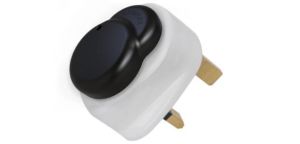Corkman Sean O’Tuama’s invention Firemole can save lives by alerting people to electronic devices that are overheating.
Describe your invention, what’s its USP?
Firemole is a patent pending, first of its kind, safety-tech gadget that can be attached to various electrical and electronic devices such as chargers, phones and plug tops. Once the Firemole detects a temperature of 54ºC, it sounds an in-built alarm, alerting users to the high temperatures. Firemole will sound the alarm way before a fire breaks out, making it a very valuable product to the user.
“I began by contacting Genesis Circuits in Cork. Frank and Tom were a tremendous help in streamlining the design and the electronics.”
How did you come up with the idea?
I worked as an electrician for years and came across numerous fires caused by faulty, ageing or counterfeit electrical devices. It was only after a close call in my own home, that got me thinking about developing the Firemole device. It makes sense to try and detect rising temperatures before a fire starts.
“Firemole went completely viral on Twitter with nearly two million impressions over a 24-hour period.”
How did you get it made, what was that process like?
Like any startup, it has been an uphill battle, but we have made significant progress over the last year. I began by contacting Genesis Circuits in Cork. Frank and Tom were a tremendous help in streamlining the design and the electronics. Once we were happy with that, I went to MAAS Engineering (also in Cork), and they made the tool for the plastic housing and metal base. By keeping everything local, it taught me an enormous amount about the manufacturing industry as I was able to call out to both Genesis and MAAS to see what was going on.
We were then accepted onto Enterprise Ireland’s New Frontiers Phase Two program in the Rubicon Centre, and that gave some much-needed funding along with a feasibility study grant which the Cork City Local Enterprise Office gave me.
We are now market ready and plan to launch a crowdfunding campaign on Indiegogo.
“With Firemole being a brand new type of product, it will take a lot of education and testing to figure out what are the best channels to market.”
The press picked up on the story and you were flooded with orders. How did that happen?
Firemole won the ‘Most Innovative Product’ award from the New Frontiers Phase Two program so I decided to send out a press release thinking that maybe my local newspaper might pick up on it. Well, they didn’t, but nearly every other major news outlet in the country did including The Journal, The Independent, The Daily Mail and various radio stations. Firemole went completely viral on Twitter with nearly two million impressions over a 24-hour period. All of this attention gave the company some great validation as pre-orders started rolling in on the Firemole.com website (which luckily I had set up the night before).
“We’ve already been contacted by distributors, so it looks like international expansion will occur quickly.”
What’s your marketing strategy for the future?
With Firemole being a brand new type of product, it will take a lot of education and testing to figure out what are the best channels to market. We are not just trying to sell people a product; we want to build a community around Firemole who want to come on the start-up journey with us and be part of this new age of safety-tech. We will be doing weekly vlogs (video blogs), so people can see what is going on in the background of the company and plan to push out as much content as possible through Facebook, Instagram, Twitter, Linkedin and YouTube.
What are your international expansion plans?
With our crowdfunding campaign, we will be selling to Europe, the US, Canada, Australia and New Zealand. We have already been contacted by major distributors who want to carry the Firemole device, so it looks like international expansion will occur quickly. Dealing with scaling the company efficiently will be the biggest challenge for this year.
“There has been a lot of Googling and awkward meetings when I was way over my head, but I think that is why I have learnt so much.”
Describe setting up your business, what curve balls and lessons have you encountered?
Getting involved in product development and manufacturing has been a very steep but enjoyable learning curve. The last year has been filled with very ‘high highs’ and crushing lows, but I suppose that is an integral part of a start-up. There has been a lot of Googling and awkward meetings when I was way over my head, but I think that is why I have learnt so much. I believe that it is essential to throw yourself in at the deep end because that way, you have to learn quickly.
If there is one thing I wish I could tell myself this time last year, it would be to ensure you have a plan B and C lined up for when A fails, as plan A will fail more times than you like.
Relying on specific sources of finance was another big mistake I made. Never believe a word until the contracts are signed, and the money is in the bank.
What supports have you received?
To date I have received €15,000 from the New Frontiers Program, €15,000 in feasibility funding from the Cork City Local Enterprise Offices and a €5,000 innovation voucher from Enterprise Ireland.
“Many companies expect to get every ounce of work they can get out of their employees, and it leads to burn out and depression very quickly.”
What do you need now?
I am currently looking to raise €400k. There needs to be a significant marketing budget for Firemole as it is not a product people will be specifically looking for. I also need to build a team. I have a few guys who do some work on the side, and it would be great to get a full-time team in place.
If you were ‘ruler for the day’. What would you do to change Ireland’s business culture?
I think Ireland’s business culture is beginning to change, but there is still a lot that can be done. I hear stories from friends that it is frowned upon to leave their office before 7 pm, even though they are not being paid for it. Many companies expect to get every ounce of work they can get out of their employees, and it leads to burn out and depression very quickly. I think if I were ruler for the day, I would try to shift the working culture for these companies from quantity to quality, as this would lead to a happier workplace.
This post was originally published here - https://www.thinkbusiness.ie/articles/firemole-overheating-plugs-prevention/ on























